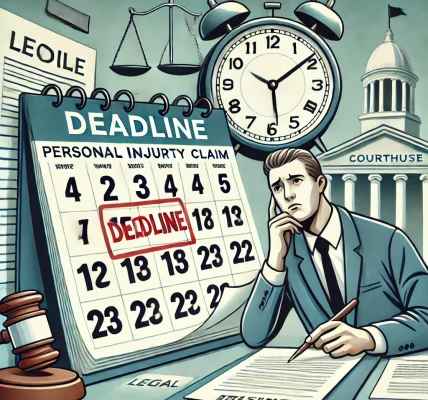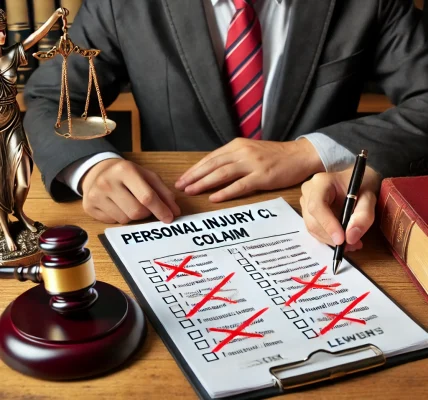When an individual is injured due to someone else’s negligence, insurance companies often play a significant role in determining compensation. Whether it’s auto insurance, homeowners’ insurance, or medical malpractice insurance, these companies influence how much an injured party may receive. However, understanding their role in personal injury cases is essential to ensuring you receive fair compensation.
In this article, we will explore the role of insurance companies in personal injury claims, common tactics they use, and how to maximize your settlement while protecting your legal rights.
The Role of Insurance Companies in Personal Injury Cases
Insurance companies are businesses that provide financial protection to policyholders in the event of accidents or injuries. Their primary goal is to minimize payouts while resolving claims efficiently. Here’s how they are typically involved in personal injury cases:
1. Investigating the Claim
Once a personal injury claim is filed, the insurance company conducts an investigation to determine liability and the extent of damages. This involves:
- Reviewing accident reports and medical records
- Speaking to witnesses
- Assessing property damage
- Examining any pre-existing conditions
2. Determining Liability
Insurance adjusters assess who was at fault in the accident. They review policy terms and state laws to determine whether their insured party was responsible for the injury. In cases of comparative fault, the injured party’s compensation may be reduced if they are found partially at fault.
3. Evaluating Medical Expenses and Damages
Insurance companies will examine the medical bills, lost wages, and pain and suffering claims submitted by the injured party. They may dispute the necessity or cost of medical treatment to minimize the payout.
4. Offering a Settlement
Most personal injury cases settle before going to trial. The insurance company will typically offer a settlement amount based on its assessment of damages. However, the initial offer is often much lower than the true value of the claim.
Common Tactics Insurance Companies Use to Minimize Payouts
Insurance adjusters are trained professionals whose job is to save their company money. Here are some common tactics they use to minimize settlements:
1. Delaying Claims Processing
Insurance companies may take longer than necessary to process a claim in the hopes that the claimant will accept a lower offer out of frustration or financial necessity.
2. Denying Liability
Insurers often argue that their policyholder was not responsible for the accident or that the injured party was partially at fault, reducing their liability.
3. Requesting Extensive Medical Records
Adjusters may ask for medical records beyond what is necessary to identify pre-existing conditions. They may then argue that the injuries were not caused by the accident but by prior health issues.
4. Making a Lowball Offer
Many insurance companies offer a quick, low settlement before the claimant fully understands the extent of their injuries. This is done to prevent larger payouts later.
5. Pressuring the Victim to Settle Quickly
Adjusters often pressure claimants to accept a settlement before they have consulted a lawyer. Accepting a settlement too early can result in inadequate compensation for long-term medical expenses and suffering.
How to Protect Your Rights and Maximize Compensation
To ensure you receive fair compensation, follow these steps:
1. Seek Medical Treatment Immediately
Documenting your injuries with medical records is crucial in proving damages.
2. Be Cautious When Speaking with Adjusters
Anything you say to an insurance adjuster can be used against you. Avoid making recorded statements without legal advice.
3. Do Not Accept the First Settlement Offer
Insurance companies often start with low offers. It’s crucial to negotiate and consult an attorney before accepting any settlement.
4. Gather Strong Evidence
Maintain records of medical bills, police reports, witness statements, and any other documentation that supports your claim.
5. Consult a Personal Injury Attorney
An experienced attorney understands insurance company tactics and can negotiate on your behalf to maximize compensation.
When a Personal Injury Case Goes to Court
If negotiations with the insurance company fail, the case may proceed to litigation. A lawsuit may be necessary if:
- The insurer denies the claim unfairly.
- The settlement offer is significantly lower than the claim’s worth.
- The policyholder’s liability is disputed.
Conclusion
Insurance companies play a crucial role in personal injury cases, but their primary goal is to minimize payouts. Understanding their tactics and how to negotiate effectively can make a significant difference in your settlement. By working with an experienced personal injury attorney and documenting all aspects of your case, you can protect your rights and increase your chances of receiving fair compensation.
If you or a loved one has suffered an injury due to negligence, consult a personal injury lawyer to navigate the claims process and fight for the compensation you deserve.




